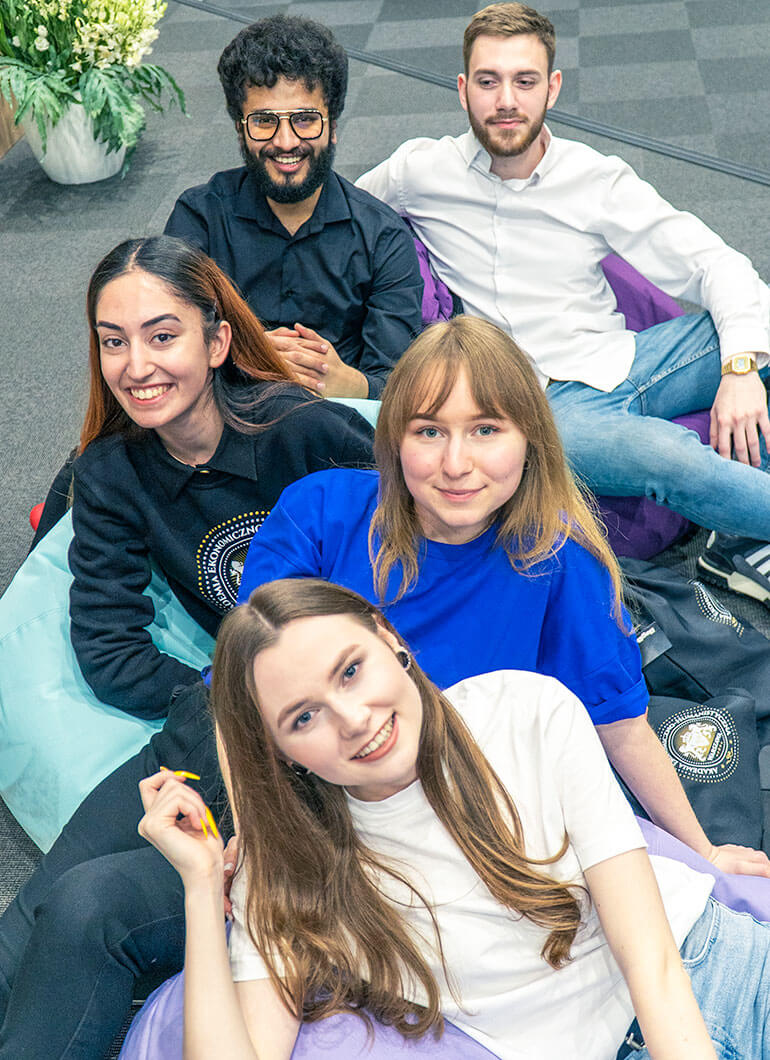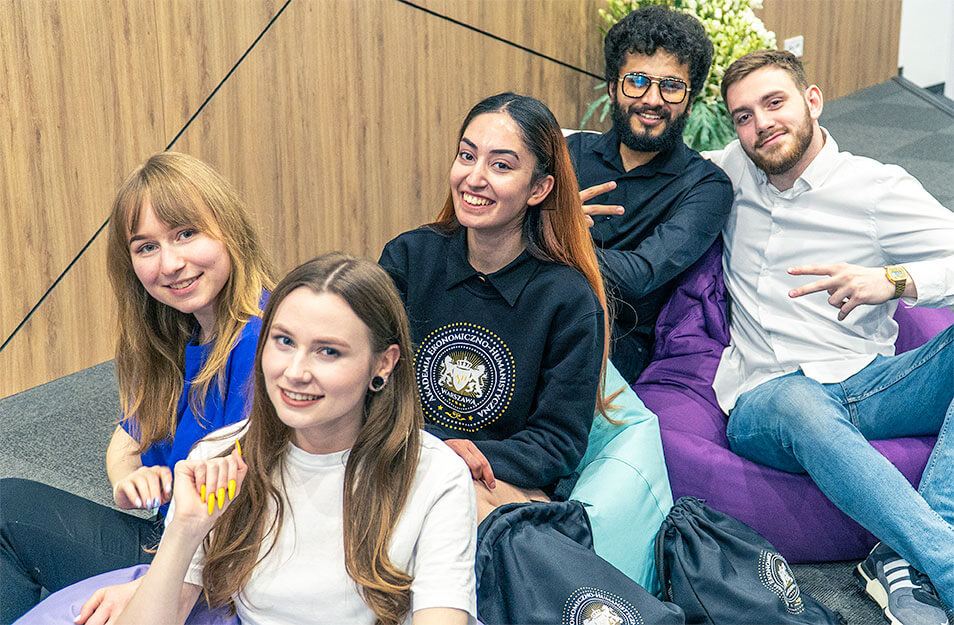Cognitive Science and Artificial Intelligence
Undergraduate (Bachelor)
Cognitive Science and Artificial Intelligence
Why choose this programme?
Did you know that building intelligent systems capable of learning, understanding language, recognizing images, and making decisions would not be possible without understanding the human mind? The Cognitive Science and Artificial Intelligence programme at VIZJA University is a unique field of study that combines insights into how the human mind works with practical knowledge of modern technologies used to design systems that emulate human thinking.
The curriculum integrates topics from psychology, neuroscience, linguistics, computer science, and advanced AI technologies—forming a solid foundation for designing intelligent machines that learn, comprehend, and interact with humans. If you are fascinated by the world of artificial intelligence and want to contribute to developing the technologies of the future, this is the programme for you.
As a student, you will explore how cognitive processes—such as attention, memory, perception, and decision-making—work and how they can be modeled using computer tools. You will develop practical analytical and research skills using instruments such as EEG, PsychoPy, and structural equation modeling (SEM). You will also gain programming and statistical competencies (Python, R, Business Intelligence) and learn to analyze language phenomena using modern tools NLP and computational linguistics. The programme also covers methods for designing cognitive experiments and interpreting research results—equipping you with the skills to create AI systems and conduct interdisciplinary research on their development.
Cognitive Science and Artificial Intelligence – what can you do after graduation?

Graduates of the Cognitive Science and Artificial Intelligence programme at VIZJA University will be well prepared to pursue diverse career paths across the IT, research, education, marketing, and creative industries.
You will be equipped to work in interdisciplinary R&D teams in tech companies, AI institutions, natural language processing (NLP) labs, or in the design of human-computer interfaces. Potential career paths include roles such as AI programmer, prompt engineer, machine learning and large language model (LLM) specialist, BCI (Brain-Computer Interface) systems designer, or data analyst in medical, educational, or business sectors.
You may also pursue a career as a UX expert who applies knowledge of cognitive and emotional processes in user-centered design. The programme also prepares graduates to work as consultants in the areas of technology ethics, digital communication, and user behavior analysis. Additionally, it provides a strong foundation for further academic and scientific development in cognitive science and AI-related fields.
This program
is for you if:
You have an analytical and open mind.
You want to contribute to the development of intelligent technologies based on interdisciplinary scientific knowledge.
You want to gain hands-on skills in AI programming, prompt engineering, data analysis, and machine learning.



Admission rules and regulations
Note: important information for 2025 candidates
Please read carefully the application procedures in line with the changes introduced by the Polish Ministry of Science and Higher Education in 2025.
Programme and structure of studies
Undergraduate studies
(bachelor’s degree)
The Bachelor’s programme in Cognitive Science and Artificial Intelligence at VIZJA University has been designed to equip students with practical skills for working at the intersection of mind sciences and modern information technologies. It combines a strong foundation in cognitive psychology, neurobiology, and the philosophy of mind with advanced knowledge of artificial intelligence, programming, machine learning, and natural language processing (NLP).
FIRST YEAR OF STUDY
The program of the first year of study includes general subjects, in academic skills and knolwedge necessary for following more specialized topics in the future. The first field-specific subjects are also introduced at this stage.
| Subject name | Cummulative amount of ECTS points | Cummulative amount of hours (FT/PT) |
|---|---|---|
| Health and Safety | 0 | 8/8 |
| Academic Skills | 1 | 15/8 |
| Introduction to Philosophy | 5 | 35/20 |
| Introduction to Psychology | 5 | 30/20 |
| Introduction to Cognitive Science | 4 | 30/16 |
| Introduction to Linguistics | 4 | 30/16 |
| Logic | 3 | 30/16 |
| Mathematics for Cognitive Scientists | 3 | 30/16 |
| Artificial Intelligence and New Technologies | 5 | 60/32 |
| Subject name | Cummulative amount of ECTS points | Cummulative amount of hours (FT/PT) |
|---|---|---|
| Sports and Recreation | 0 | 30/0 |
| Foreign Language (Elective) | 2 | 30/16 |
| Computer Science | 4 | 45/24 |
| Quantitative Methods - Statistics | 5 | 60/40 |
| Biological Basis of Behavior | 3 | 30/24 |
| Cognitive Processes | 5 | 60/40 |
| Research Methodology | 5 | 60/32 |
| Prompt Engineering | 3 | 30/16 |
| Cognitive Linguistics | 3 | 30/16 |
SECOND YEAR OF STUDY
The second year comprises further field-specific courses with an emphasis on issues related to psychology and linguistics. Students also learn about methods and tools relating to statistical and marketing research as well as artificial intelligence.
| Subject name | Cummulative amount of ECTS points | Cummulative amount of hours (FT/PT) |
|---|---|---|
| Sports and Recreation | 0 | 30/0 |
| Foreign Language (Elective) | 2 | 30/16 |
| Applications of Statistics in Psychological Sciences | 5 | 60/40 |
| Python Programming | 5 | 60/32 |
| Human Developmental Psychology | 4 | 30/24 |
| EEG Research Methodology | 5 | 60/32 |
| Basics of marketing | 3 | 30/24 |
| Experimental Cognitive Science | 3 | 30/16 |
| Philosophy of Mind | 3 | 30/16 |
| Subject name | Cummulative amount of ECTS points | Cummulative amount of hours (FT/PT) |
|---|---|---|
| Foreign Language (Elective) | 2 | 30/16 |
| Artificial Intelligence and Expert Systems | 5 | 45/24 |
| Web Data Analysis | 3 | 30/16 |
| Psychology of Individual Differences | 3 | 30/24 |
| Research Ethics | 2 | 15/8 |
| Advanced Academic Skills | 3 | 24/16 |
| Statistics in R: Introduction | 3 | 30/16 |
| Computational Linguistics | 4 | 30/16 |
| Human-Computer Interfaces and Communication | 5 | 45/24 |
THIRD YEAR OF STUDY
The third year of study is devoted to further field-specific courses, implemented in the form of lectures and practical classes. At this stage, students prepare a thesis in the form of a social project, which replaces the obligation to write an undergraduate thesis.
| Subject name | Cummulative amount of ECTS points | Cummulative amount of hours (FT/PT) |
|---|---|---|
| Foreign Language (Elective) | 3 | 30/16 |
| Business Intelligence Tools | 3 | 30/16 |
| Research Procedures in PsychoPy / Eye-tracking and Psychophysiological Research (Elective 1/2) | 4 | 30/16 |
| Psycholinguistics / Fundamentals of Social Communication (Elective 1/2) | 4 | 30/24 |
| Psychopathology / Psychometrics (Elective 1/2) | 5 | 30/24 |
| Big Questions in Contemporary Psychology / Challenges of Postmodernity (Elective 1/2) | 3 | 30/16 |
| Large Language Models and NLP | 4 | 60/32 |
| Project Preparation Methodology | 4 | 30/16 |
| Subject name | Cummulative amount of ECTS points | Cummulative amount of hours (FT/PT) |
|---|---|---|
| Psychology of Consumer Behavior / Psychology of Creativity (Elective 1/2) | 4 | 30/16 |
| IT Project Management / Customer Relationship Management (Elective 1/2) | 4 | 30/24 |
| Educational Psychology / Emotions and Motivation (DW 1/2) | 4 | 30/24 |
| Psychology of Consciousness and Embodiment / Positive Psychology and Sociology of Happiness (Elective 1/2) | 4 | 30/16 |
| Psychology of Video Games / Design Thinking (Elective 1/2) | 4 | 30/16 |
| Introduction to Structural Equation Modeling (SEM) / Linear Modeling in R (Elective 1/2) | 4 | 30/16 |
| Social Project | 6 | 30/16 |
The content of the study program may change as a result of efforts to improve the quality of education and adapt the teaching offer to the current challenges of the labor market. Each change is approved by the University Senate and introduced with the aim of preparing students for their future careers in the best possible way.
Tuition fees
Fixed tuition - flexible payments
By choosing to study at VIZJA University, you can be sure that the tuition fee will not change throughout the duration of your studies. You can pay the tuition fee once for the entire year of study or spread over a semester payment. This allows you to decide how you want to plan your expenses.

Scholarships - easier than you think

While studying at VIZJA University, you can take advantage of a wide range of financial support from the state budget and European funds, as well as benefit from special discounts with VIZJA University discount program
You can submit most scholarship applications quickly and easily through your online account.
In the academic year 2023/2024, VIZJA University awarded 800 Rector’s Scholarships, ranging from PLN 400 /month to PLN 1000 /month, depending on the average or achievements. For outstanding sport, artistic or scientific achievements, the Scholarship Committee awarded scholarships of PLN 600 /month.
Detailed information on the possibility of applying for the Rector’s Scholarship is available in the dean’s system.
A sports scholarship may be awarded to a student who excels in sport achievements at least national level. In addition we also encourage our students to take part in additional support programs- eg. the National Academic Representation.
Young sportsmen can count on financial support in the amount of PLN 600 /month.
Detailed information on the possibility of applying for sports scholarship is available in the dean’s system.
A scholarship for people with disabilities may be awarded to a student who has a disability certificate, a disability degree certificate, a ZUS certifying physician’s certificate, a disability group certificate or a certificate of permanent or long-term incapacity to work on a farm.
In the 2023/2024 academic year, depending on the degree of disability, 350 scholarships for people with disabilities were awarded, ranging from PLN 1700 /month to PLN 1900 /month.
Detailed information on the possibility of applying for a scholarship for people with disabilities is available in the dean’s system.
The allowance is a form of emergency financial assistance. Any student who found himself temporarily in a difficult life situation resulting from random events beyond the student’s control can apply for it.The allowance may be granted twice in one academic year, and the allowance is not granted twice for the same random event.
In 2024, we granted 51 allowances for a total of PLN 255 000. The allowances, depending on the student’s situation, were paid in the amount of PLN 2,000 to PLN 5,000 at a time.
Detailed information on the possibility of applying for the allowance is available in the dean’s system.
2023/2024 academic year
800 Rector’s Scholarships
51 allowances
350 scholarships for people with disabilities
12 500 000 PLN was spent in 2023/2024 on scholarships
PLN 1,890,289.35 was spent in 2019/2020 on scholarships
PLN 2,911,662.50 was spent in 2020/2021 on scholarships
PLN 4,158,177.00 was spent in 2021/2022 on scholarships
PLN 7,829,950.00 was spent in 2022/2023 on scholarships
Rector’s Scholarship – highest average: 5,44





